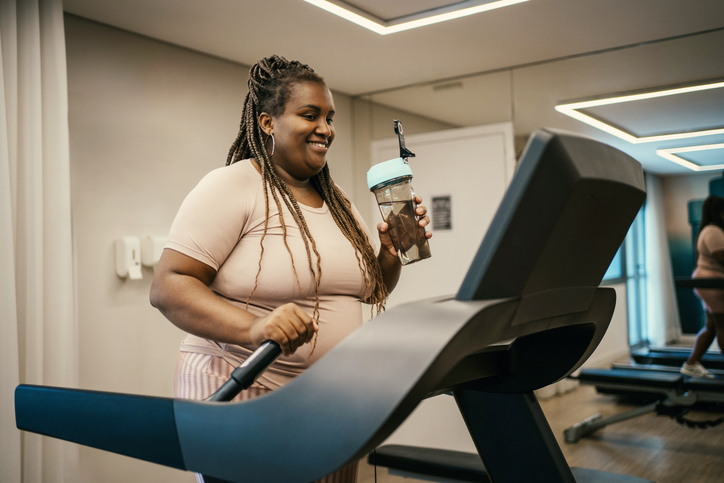Weight Loss: Culturally Sensitive Program May Help Black Women
New Culturally Sensitive Weight Loss Program May Help Black Women Fight Obesity
Losing weight can be a challenge, especially for Black women living in the U.S. According to the U.S. Department of Health and Human Services Office of Minority Health, African American women experience the highest rates of obesity and being overweight among all demographic groups in the United States, with around 80% classified as overweight or obese. Structural racism is a well-documented factor contributing to health disparities within the Black community, as it limits access to nutritious foods, safe spaces for physical activity, and vital health services, including insurance and medication.
What if Black women had access to a supportive and effective approach to weight loss that takes these barriers into account?

Source: Jay Yuno / Getty
A culturally sensitive weight loss plan maybe the answer.
A 2022 study conducted by Carolyn M. Tucker of the Patient-Centered Outcomes Research Institute focused on weight loss maintenance among Black women with obesity using two distinct programs over a six-month period: a culturally sensitive program and a standard program. Involving 356 Black women with an average age of 55, the culturally sensitive program trained doctors to foster comfort and address barriers to healthy choices.
To develop these practices, the team conducted two group discussions with Black women who shared similarities with the study participants. In contrast, the standard program emphasized general behavior change information where doctors learned how to ask questions that support women in maintaining their weight loss.
After one year, participants in the culturally sensitive program lost an average of 7.5 pounds and reported fewer barriers to healthy eating and physical activity, with both groups showing similar results in blood pressure, blood sugar, and quality of life. However, the study had limitations, as only about half of the participants completed the initial weight loss program, and COVID-19 potentially disrupted participation.
These findings suggest that culturally tailored approaches may enhance weight loss maintenance for Black women. Future research should focus on enhancing the implementation of these programs and examining how Black women can maintain a healthy weight beyond their exercise routines.
Here are a few tips on how to maintain a healthy lifestyle using a cultural based approach.

Source: Renata Angerami / Getty
- Culturally Relevant Nutrition Education: Incorporate familiar foods and cooking methods into meal planning. Focus on healthier versions of traditional dishes, emphasizing whole grains, lean proteins, and plenty of vegetables.
- Community Support: Engage with local community groups or support networks that understand cultural nuances. Sharing experiences and strategies can motivate and provide accountability.
- Personalized Goal Setting: Set achievable and culturally relevant weight loss goals. Focus on small, manageable changes rather than drastic shifts to maintain motivation.
- Culturally Sensitive Healthcare: Seek healthcare providers who are trained in culturally sensitive practices. This can create a more comfortable environment for discussing weight loss and health to keep you on track along your fitness journey and help to fight obesity.
- Incorporate Physical Activity: Choose physical activities that resonate culturally, such as dance classes, or community sports, making exercise enjoyable and social.
- Mindfulness and Stress Management: Practice mindfulness techniques that may resonate culturally, such as meditation, yoga, or community gatherings to help manage stress, which can impact weight.
- Celebrate Progress: Acknowledge and celebrate milestones, big and small, within the community. This fosters a positive environment and encourages continued effort.
- Seek Professional Guidance: Work with dietitians or nutritionists who specialize in culturally tailored programs to create personalized meal plans and strategies.
By incorporating these culturally relevant strategies, Black women can embark on a supportive, enjoyable, and effective weight loss journey that honors their unique backgrounds and preferences, helping them continue to shed pounds along the way.
RELATED CONTENT: This ‘Slimming’ Superfood Is Being Heralded As ‘Poor Man’s Ozempic’







